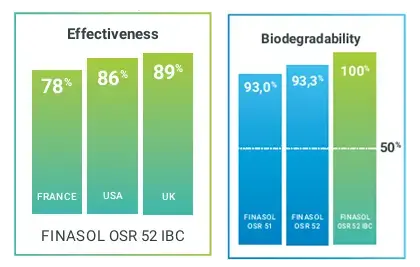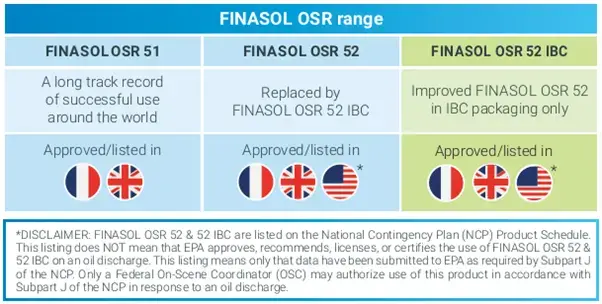
FINASOL OSR Marine Dispersants
Used across all oceans for over 30 years, the FINASOL OSR range of marine dispersants is the result of proven expertise in developing optimized solutions for the effective dispersion of crude oil in seawater.
The concentrated dispersants in the FINASOL OSR range are considered market benchmarks due to their dispersion performance in a wide range of conditions (types of crude, temperature, salinity, etc.), their biodegradability, and their extensive portfolio of approvals (including ecotoxicity tests on local marine species).

They can be used neat or diluted to 10% in seawater (type 2 and 3 dispersants according to the UK Marine Management Organization classification).
FINASOL OSR Range
Discover the features of FINASOL OSR marine dispersant range and download our product brochure.

FINASOL OSR 52 IBC
A successor to FINASOL OSR 52, the FINASOL OSR 52 IBC dispersant is an evolution of this historic reference.
Already approved in France (CEDRE), the United Kingdom (MMO), and the United States (US EPA), it is currently undergoing approval in other countries to achieve global coverage.
Continuing the legacy of FINASOL OSR 52, FINASOL OSR 52 IBC provides an effective response under varied usage conditions.
FINASOL OSR 52
First product on the market compliant with the three major international regulations (US EPA, MMO, CEDRE), it became a market reference. Its approval portfolio was later expanded to cover many countries across five continents.
Now replaced by FINASOL OSR 52 IBC in the range, it is no longer produced or marketed. However, TotalEnergies Fluids continues to provide the necessary support to maintain key approvals, allowing the use of existing stock.
FINASOL OSR 51
FINASOL OSR 51 complies with UK (MMO) and French (CEDRE) regulations.
Why and how to use marine dispersents?
The use of marine dispersants is among the possible options, alongside mechanical recovery or in-situ burning. The use of dispersants aims to protect habitats of vulnerable species by preventing the oil slick from reaching the coast. Dispersants work by breaking the oil slick into microscopic droplets, enabling faster biodegradation within the water column.
In the event of an accidental oil spill at sea, local authorities are responsible for determining (or validating) the most appropriate response, following a Net Environmental Benefit Analysis (NEBA) that considers the natural environment, weather conditions, surrounding economic activity, and other parameters.
Our technical representatives are available for any questions: